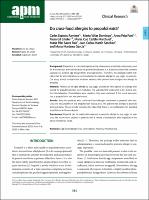Do cross-food allergies to propofol exist?
Author
Date
2022-10Permanent link
https://hdl.handle.net/11351/9857DOI
10.17085/apm.22195
ISSN
2383-7977
PMID
36317430
Abstract
Background: Propofol is a short and rapidly acting intravenous anesthetic extensively used for the induction and maintenance of general anesthesia. It is a lipid emulsion that contains soybean oil, purified egg phosphatide, and egg lecithin. Therefore, the package leaflet indicates that its administration is contraindicated in patients allergic to soy, eggs, or peanuts. Our study aimed to determine whether patients with proven food allergies are allergic to propofol.
Methods: Patients of all ages allergic to soy, eggs, or peanuts who agreed to undergo skin testing for propofol allergies were included. The subjects first underwent a skin test to confirm food allergies. If candidates were negative, they were excluded. If the result was positive, a propofol skin test was performed.
Results: Sixty-four patients with confirmed food allergies underwent a propofol skin test. Only one was positive in the propofol skin test (1.6%). The patient was allergic to peanuts and soybeans. These results reinforce the idea that there is no justification for avoiding propofol use in these subjects.
Conclusions: Propofol can be safely administered to patients allergic to soy, eggs, or peanuts. We recommend caution in patients with a history of anaphylaxis after ingestion of the above-mentioned foods.
Keywords
Food allergy; Food sensitization; PropofolBibliographic citation
Espinós Ramírez C, Viñas Domingo M, Peig Font A, Gil Esteller P, Castillo Marchuet MJ, Saura Foix MP, et al. Do cross-food allergies to propofol exist?. Anesth Pain Med. 2022 Oct;17(4):381-85.
Audience
Professionals
This item appears in following collections
The following license files are associated with this item:

 Private area
Private area Contact Us
Contact Us








